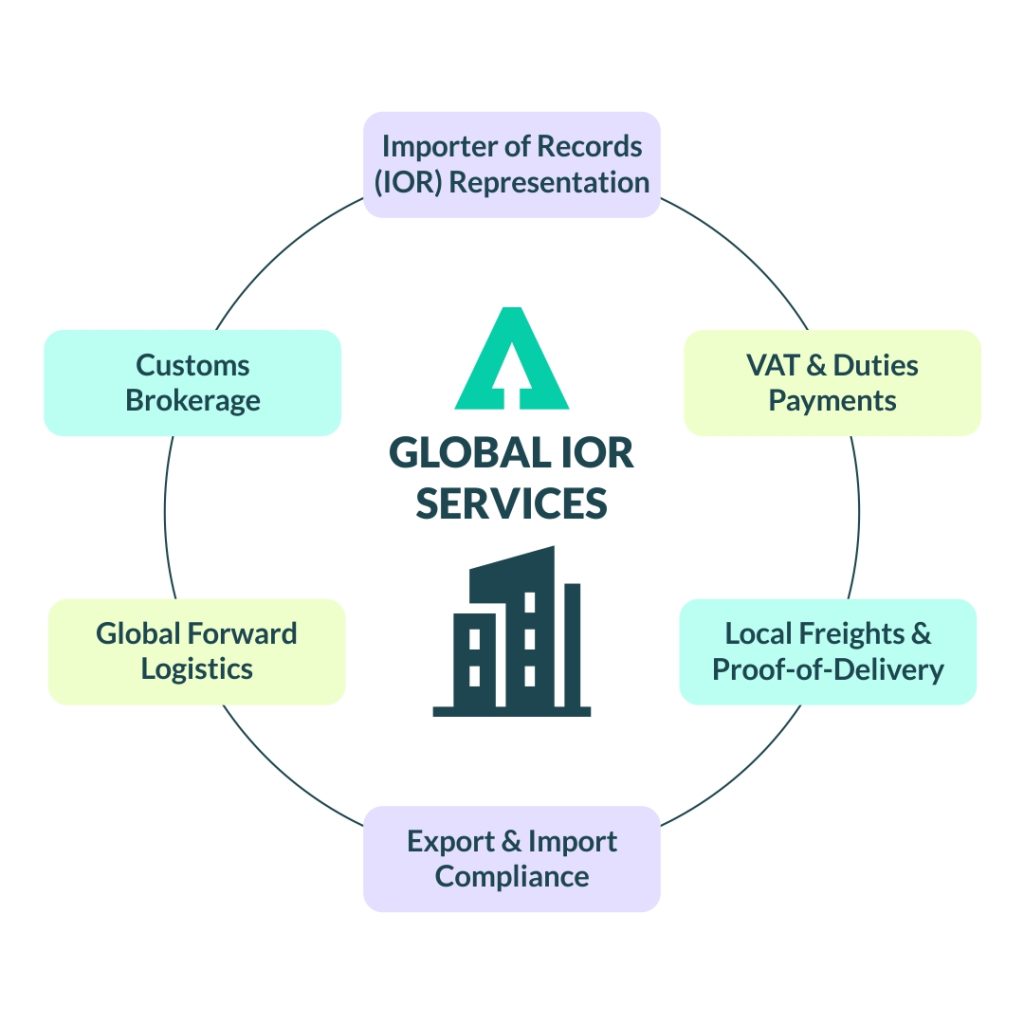What Is an Importer of Record (IOR)?
International trade is complex, especially for global traders dealing with regulations, tariffs, and paperwork. One misstep at customs can lead to delays and financial losses. That’s where an Importer of Record (IOR) becomes indispensable. Acting as your trusted representative, the IOR ensures your goods clear customs smoothly and legally.
But what exactly does an IOR handle, and why is this role so critical? This article explores the responsibilities and advantages of working with a professional IOR, highlighting how they can simplify your international transactions, prevent costly errors, and ultimately improve your global supply chain.
Introduction to the Importer of Record (IOR)
In global trade, the Importer of Record (IOR) is a key player. The IOR is the legal entity responsible for ensuring that imported goods meet all legal and regulatory requirements of the destination country. As a global trader, understanding the role of the IOR is important for smooth and compliant operations. The IOR serves as the primary point of contact for customs authorities and takes on significant responsibilities in the import process, including filing accurate customs documentation, paying applicable duties and taxes, ensuring compliance with import regulations, and keeping meticulous records for potential audits. This is especially beneficial for traders who may not have a legal entity established in the importing country.
Pro Tip: Did you know that the IOR is also responsible for ensuring that imported goods comply with product safety and labeling requirements in the destination country? This often overlooked aspect can lead to significant delays and penalties if not handled correctly. Unicargo’s team of experts is well-versed in these details, ensuring your imports meet all necessary standards.
Beyond paperwork, the IOR must possess a deep understanding of complex trade laws, stay up-to-date on constantly changing regulations, and proactively manage potential risks associated with imports. The IOR acts as a guardian of compliance, ensuring your shipments meet all necessary requirements. This is crucial for maintaining the integrity of global supply chains and supporting the smooth flow of international commerce. Failure to comply with import regulations can result in serious consequences, including hefty fines, penalties, and costly shipment delays. This highlights the importance of the IOR’s role in ensuring seamless and compliant international trade.

Roles and Responsibilities of an Importer of Record
The Importer of Record (IOR) plays a key role in ensuring compliance with all customs regulations and overseeing the clearance process for imported goods. The IOR is responsible for accurately calculating and paying duties and taxes associated with each shipment. As the primary point of contact for customs authorities, the IOR is accountable for adhering to all relevant laws and regulations, and effectively handling the complexities of international trade on behalf of the importer. Let’s break down their key responsibilities:
Compliance and Customs Clearance
Managing compliance and customs clearance is a demanding task. The IOR shoulders the responsibilities of managing documentation, guaranteeing regulatory adherence, and facilitating smooth customs processes. This requires expert knowledge of international trade regulations and customs procedures. They collaborate with customs brokers to prepare and submit accurate documentation, including commercial invoices, packing lists, certificates of origin, and import licenses.
Pro Tip: Leverage Free Trade Agreements (FTAs) to your advantage. Utilizing FTAs can significantly reduce duty costs for eligible goods. Unicargo’s experts can help you identify and choose applicable FTAs, maximizing your cost savings.
Your IOR possesses a deep understanding of import/export regulations, ensuring the correct application of Harmonized System (HS) codes, adherence to country-specific import requirements, and staying updated on evolving trade laws and restrictions. They facilitate customs clearance by coordinating with customs officials, addressing any queries or concerns promptly, and paying import duties and taxes on time. They also manage potential customs audits, maintaining detailed records and demonstrating due diligence in compliance efforts on your behalf.
Payment of Duties and Taxes
Accurate and timely payment of duties and taxes is crucial. Your IOR takes on this responsibility, ensuring all import duties and taxes are calculated correctly and paid on time. This requires a deep understanding of various calculation methodologies and their application to different types of goods. Your IOR will accurately determine the value of your imported goods, apply the correct tariff classifications, calculate applicable duties and taxes (e.g., VAT, GST), and ensure timely payment to customs authorities.
Pro Tip: Consider using duty drawback programs to recover duties paid on imported goods that are subsequently exported or used in the production of exported goods. Unicargo’s expertise in duty drawback can help you maximize your cost recovery potential.
Choosing the Right IOR Service Provider
Choosing the right Importer of Record (IOR) service provider is a critical decision that can significantly impact your operational efficiency, compliance, and bottom line. A professional IOR with experience in handling imports and complex logistical requirements can offer numerous benefits, including simplified customs clearance, regulatory compliance, and reduced liability for your business. Conversely, failing to engage a reputable IOR can expose you to significant risks, such as delays, fines, and legal complications that could severely disrupt your supply chain and damage your reputation.
Benefits of Working with a Professional IOR
Partnering with a professional Importer of Record (IOR) service provider can significantly enhance your import operations and simplify your global supply chain. These experts bring a wealth of benefits to your business, ensuring smooth and efficient international trade processes.
They provide unparalleled expertise in international trade regulations, helping you stay compliant with ever-changing rules and avoid costly mistakes. They streamline the customs clearance process, reducing delays and getting your goods to market faster. By mitigating risks and ensuring compliance, they minimize legal and financial risks associated with importing, protecting your business from potential penalties and reputational damage.
Pro Tip: A professional IOR can help you leverage Bonded Warehousing to defer duty payments until goods are released into the market, improving cash flow and providing greater flexibility in managing your inventory.
Professional IORs also offer significant cost savings through optimized duty and tax calculations, ensuring you pay the correct amounts without overpaying. They provide access to industry knowledge and best practices, allowing you to leverage their experience to improve your operations.
Risks of Not Using an IOR
Attempting to manage international imports without an Importer of Record (IOR) can expose your business to significant risks and potential problems. Without the expertise of an IOR, you assume full responsibility for compliance with import regulations, a challenging task that can lead to non-compliance, resulting in penalties, fines, shipment delays, and disruptions. Incorrect documentation or missed requirements can cause goods to be held at customs, leading to costly delays and potential storage fees.
Furthermore, you could face legal action for import violations, potentially damaging your brand reputation and impacting your ability to conduct business internationally.
Pro Tip: Failing to properly classify your goods can lead to significant overpayment of duties. A professional IOR can ensure accurate classification and help you avoid unnecessary costs.
Different Types of IORs
Understanding the different types of Importer of Record (IOR) services available is important for choosing the best approach for your business needs. There are three main types:
- Direct IOR: Your company acts as its own importer of record, assuming all responsibilities and liabilities. This offers full control but requires extensive knowledge of import regulations and processes.
- Indirect IOR: You use a third-party service provider to handle IOR duties on your behalf. This reduces your liability and simplifies the process but may be more expensive.
- IOR Agent: A specialized entity acts as the IOR for multiple companies. This provides expertise and flexibility but may have limited capacity during peak seasons.
When choosing an IOR service, consider your import volume, familiarity with international trade regulations, risk tolerance, and budget.
Pro Tip: For importers with a global presence, consider an IOR provider with a network of experts in multiple countries to ensure consistent compliance and efficient operations across different markets.
Common Questions about the Importer of Record
Who Can Act as the Importer of Record?
To act as an Importer of Record, you must meet specific legal and financial requirements set by customs authorities in the importing country. This typically includes being a registered legal entity in the importing country, possessing valid import/export authorization, demonstrating financial solvency, and maintaining thorough knowledge of import regulations and compliance procedures.
As the Importer of Record, you assume significant responsibilities for ensuring compliance, paying duties and taxes, and maintaining proper documentation. If you’re unsure about your ability to fulfill these requirements, consider partnering with a licensed customs broker or freight forwarder who can guide you through the process or act as the Importer of Record on your behalf.
Pro Tip: When choosing an IOR, ensure they have a proven track record of compliance and a deep understanding of the specific regulations governing your industry and the countries you import from.
Importer of Record vs. Consignee
The Importer of Record (IOR) and the consignee are distinct entities with different responsibilities. The IOR bears legal responsibility for the shipment, guarantees compliance with import regulations, pays duties, taxes, and fees, and may or may not take physical possession of the goods. The consignee is the recipient of the imported goods, taking ownership upon arrival and managing storage and distribution, but doesn’t necessarily handle legal or regulatory aspects.
Understanding these distinctions will help you make informed decisions when structuring your import operations.
Pro Tip: Clearly defining the roles and responsibilities of the IOR and consignee in your import contracts can help avoid confusion and potential disputes.
Changing the Importer of Record
While possible, changing the Importer of Record during the import process can be complex. To do so, you’ll need to follow specific legal procedures and provide updated documentation, including notifying customs authorities, submitting amended import declarations, and transferring duties and responsibilities to the new IOR.
It’s crucial to understand the potential implications of changing the IOR, such as potential delays, additional costs, and possible disruptions to your supply chain.
Pro Tip: If you’re considering changing your IOR, consult with a professional provider like Unicargo to assess the potential impact and ensure a smooth transition.
Unicargo’s IOR Solutions: Expertise and Efficiency for Global Importers
Unicargo’s IOR solutions are designed to meet the needs of global traders, leveraging deep industry expertise and technology to simplify and improve your import operations. As your trusted importer of record, Unicargo understands the complex landscape of international trade regulations, ensuring compliance and minimizing risks for your shipments.
With Unicargo’s IOR service, you benefit from:
- Extensive Compliance Expertise: Ensuring your imports meet all necessary requirements and minimizing the risk of penalties and delays.
- Seamless Customs Clearance: Facilitating efficient customs clearance, minimizing delays, and ensuring your goods reach their destination on time.
- Efficient Management of Duties and Taxes: Ensuring accurate and timely payments, optimizing your import costs, and minimizing financial risks.
- Real-Time Visibility and Control: Providing real-time tracking and visibility into your shipments, allowing you to monitor progress and make informed decisions.
- Scalability and High-Volume Handling: Managing imports of any size, ensuring efficient processing and timely delivery.
- Global Team, Local Expertise: Our teams are physically present in Asia, EMEA, and North America, providing you with efficient and agile solutions, around the clock.
Unicargo helps you optimize your import operations, reduce costs, and mitigate risks. Partnering with Unicargo allows you to focus on growth while they handle the complexities of international trade.
Contact Unicargo today to schedule a consultation with our experts and discover how our tailored IOR solutions can improve your global import operations and drive significant cost savings for your business.
Additional sources:
World Trade Organization (WTO): www.wto.org
World Customs Organization (WCO): www.wcoomd.org
U.S. Customs and Border Protection (CBP): www.cbp.gov


